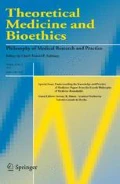Abstract
In this paper I briefly summarize Pellegrino’s phenomenological analysis of the ethics of the physician–patient relationship. In delineating the essential elements of the healing relationship (the fact of illness, the profession of healing, and the act of medicine), Pellegrino demonstrates the necessity for health care professionals to understand the patient’s lived experience of illness. In considering the phenomenon of illness, I identify certain essential characteristics of illness-as-lived that provide a basis for developing a rigorous understanding of the patient’s experience. I note recent developments in the systematic delivery of health care that make it difficult for health care professionals to realize Pellegrino’s ethical model of the role of healer. Such developments limit both the physician’s freedom to act on behalf of the patient without the constraint of third parties and the physician’s freedom to act in light of his or her own ethical or religious convictions. Given these difficulties, I note MacIntyre’s call for the development of moral communities, as an alternative to the prevailing culture, and share a first-hand example illustrating how intentional Christian community provides an alternative nurturing context that permits the full development of the healing relationship.
Similar content being viewed by others
Notes
References
Pellegrino, Edmund D., and David C. Thomasma. 1981. A philosophical basis of medical practice: Toward a philosophy and ethic of the healing professions. New York: Oxford University Press.
Pellegrino, Edmund D. 2004. Philosophy of medicine and medical ethics: A phenomenological perspective. In Handbook of bioethics: Taking stock of the field from a philosophical perspective, ed. George Khushf, 183–202. Dordrecht: Kluwer.
Pellegrino, Edmund D. 2006. Toward a reconstruction of medical morality. American Journal of Bioethics 6(2): 65–71.
Pellegrino, Edmund D. 1979. Humanism and the physician. Knoxville: University of Tennessee Press.
Pellegrino, Edmund D. 2014. Medicine as a moral enterprise. 21st Annual Clarke Family Lecture in Medical Ethics at University of Notre Dame, Notre Dame, IN, March 27, 2009. https://youtu.be/h6Em4VFE-7I.
Toombs, S. Kay. 1992. The meaning of illness: A phenomenological account of the different perspectives of physician and patient. Dordrecht: Kluwer.
Baron, Richard J. 1985. An introduction to medical phenomenology: I can’t hear you while I’m listening. Annals of Internal Medicine 103: 606–611.
Toombs, S. Kay. 2006. Vulnerability and the meaning of illness: Reflections on lived experience. In Health and human flourishing: Religion, medicine, and moral anthropology, ed. Carol R. Taylor and Roberto Dell’Oro, 119–140. Washington, DC: Georgetown University Press.
Toombs, S. Kay. (ed.). 2001. Reflections on bodily change: The lived experience of disability. In Handbook of phenomenology and medicine, 247–261. Dordrecht: Kluwer.
Oregon Public Health Division. 2018. Oregon death with dignity act: 2017 data summary. Salem: Oregon Health Authority. https://www.oregon.gov/oha/ph/providerpartnerresources/evaluationresearch/deathwithdignityact/documents/year20.pdf.
Schutz, Alfred. 1962. Symbol, reality, and society. In Collected papers I: The problem of social reality, ed. Maurice Natanson, 287–356. The Hague: Martinus Nijhoff.
Schutz, Alfred. 1967. The phenomenology of the social world. Trans. George Walsh and Frederick Lehnert. Evanston: Northwestern University Press.
Schutz, Alfred, and Thomas Luckmann. 1973. The structures of the life-world. Trans. Richard M. Zaner and H. Tristram Engelhardt Jr. Evanston: Northwestern University Press.
Schutz, Alfred. 1976. Making music together: A study in social relationship. In Collected papers II: Studies in social theory, ed. Arvid Brodersen, 159–178. The Hague: Martinus Nijhoff.
Pellegrino, Edmund D. 2011. Professing medicine or pursuing professionalism: Ethics or affect? Seminar at University of Chicago, Chicago, IL, October 5, 2011. In Medical professionalism and the future of American medicine, org. Mark Siegler. https://youtu.be/bIv2xrAAr3k.
Stahl, Ronit Y., and Ezekiel J. Emanuel. 2017. Physicians, not conscripts—conscientious objection in health care. New England Journal of Medicine 376: 1380–1385.
Ballantyne, Angela, Robert Card, Steve Clarke, Katrien Devolder, Thomas Douglas, Alberto Giubilini, Jeanette Kennett, et al. 2016. Consensus statement on conscientious objection in healthcare. Practical Ethics (blog). August 29, 2016. http://blog.practicalethics.ox.ac.uk/2016/08/consensus-statement-on-conscientious-objection-in-healthcare.
Christian Medical and Dental Society of Canada v. College of Physicians and Surgeons of Ontario, 2018 ONSC 579 (CanLII). http://canlii.ca/t/hq4hn.
MacIntyre, Alasdair. 2007. After virtue: A study in moral theory, 3rd ed. Notre Dame: Notre Dame Press.
Author information
Authors and Affiliations
Corresponding author
Additional information
Publisher's Note
Springer Nature remains neutral with regard to jurisdictional claims in published maps and institutional affiliations.
Rights and permissions
About this article
Cite this article
Toombs, S.K. The healing relationship: Edmund Pellegrino’s philosophy of the physician–patient encounter. Theor Med Bioeth 40, 217–229 (2019). https://doi.org/10.1007/s11017-019-09490-z
Published:
Issue Date:
DOI: https://doi.org/10.1007/s11017-019-09490-z




